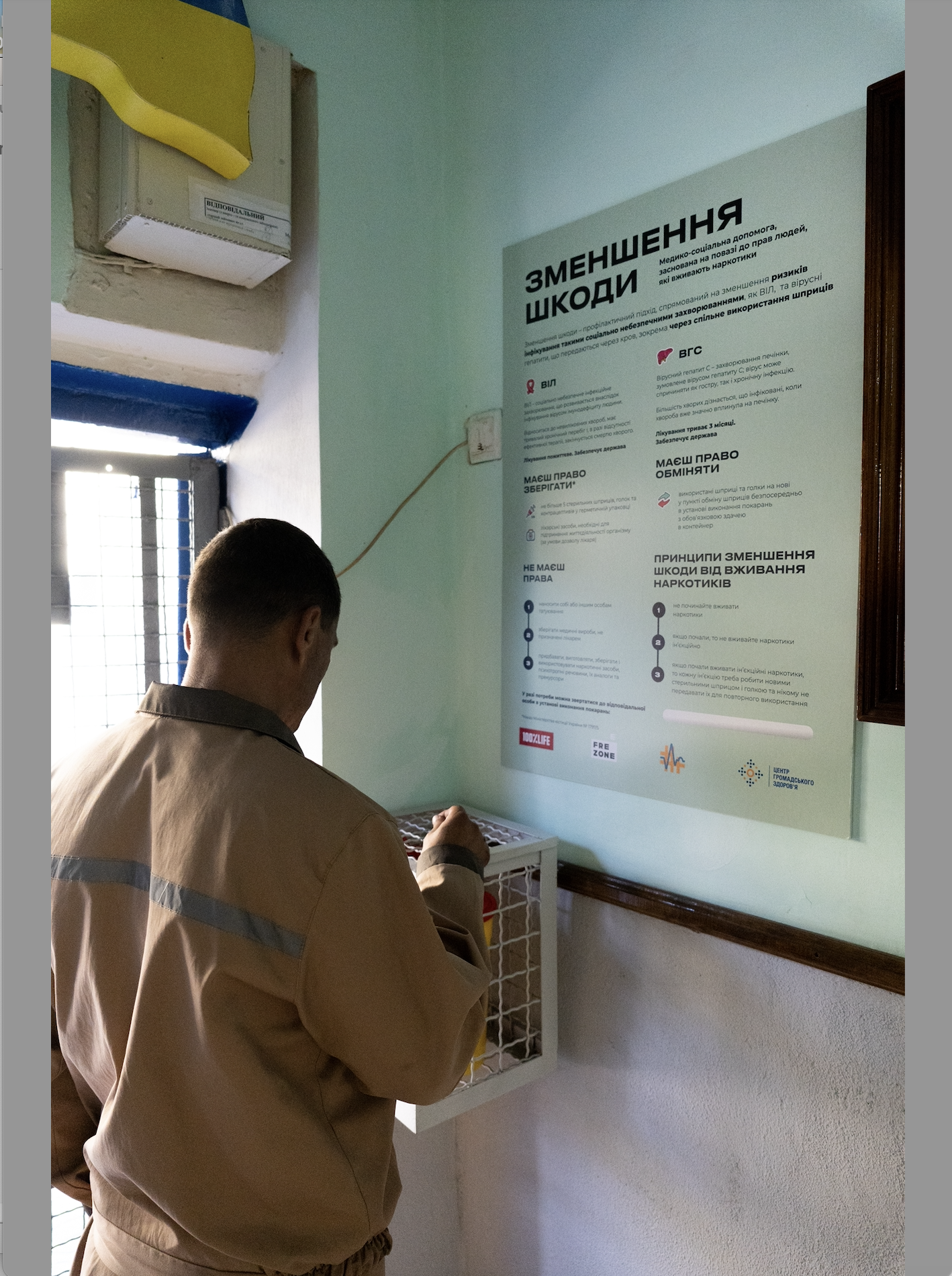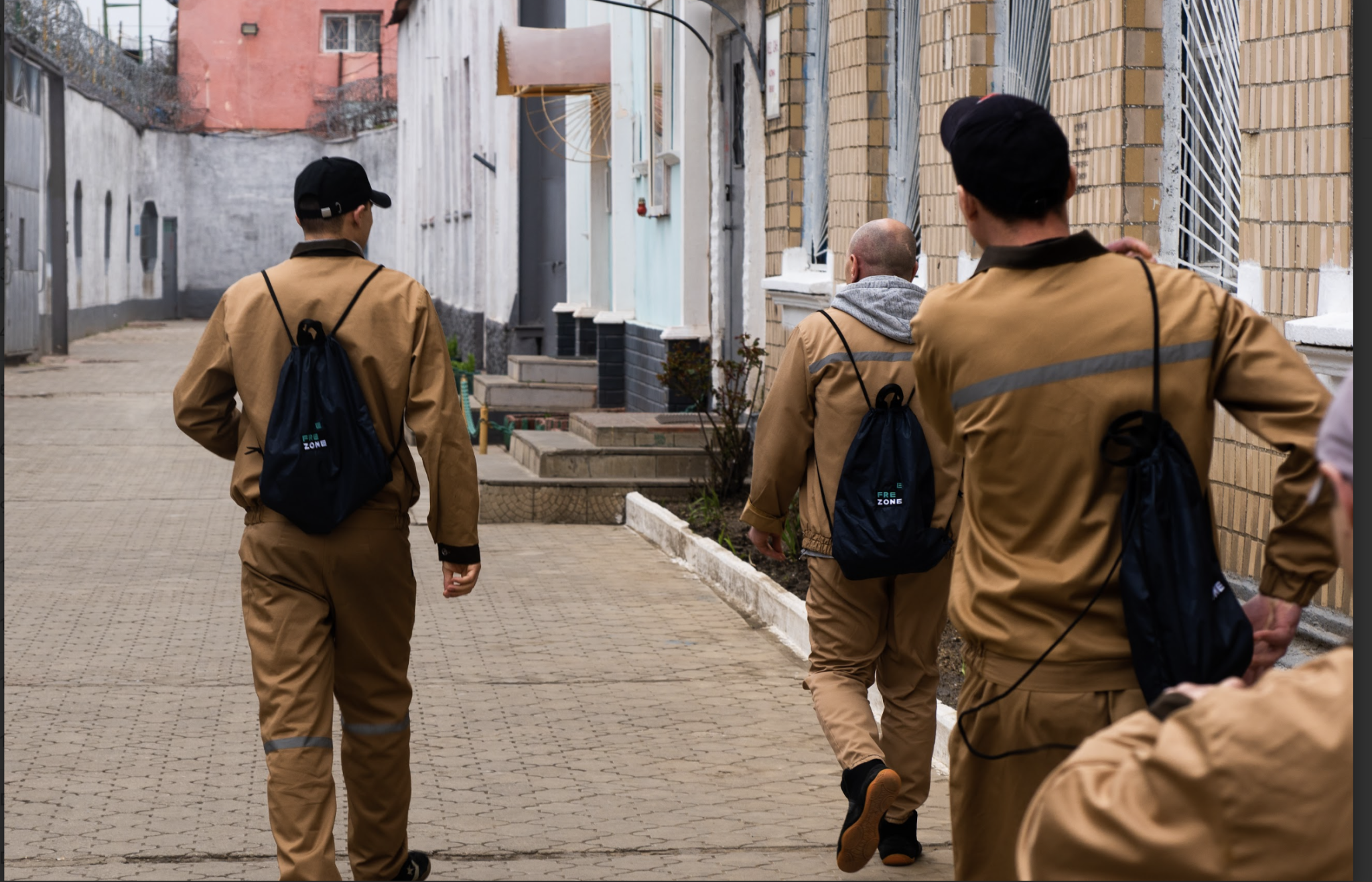- Opinion
- 09 Jul 24
Compassion in Conflict: Harm Reduction for Prisoners in Ukraine

A groundbreaking Needle and Syringe Programme has been introduced in Ukraine. Will other European countries follow? Tony Duffin and Oleksii Zagrebelnyi report...
Harm reduction principles focus on addressing the risks associated with drug use without promoting or condemning it. This approach involves helping individuals reduce harm, meeting their specific needs, and recognising and supporting them in reaching their full potential.
In March 2024 at the 67th UN Commission on Narcotic Drugs in Vienna, a significant vote was passed on a U.S. led resolution encouraging countries to adopt "Harm Reduction" measures to address drug overdoses and safeguard public health. 38 countries voted in favour, six countries abstained and two countries voted against the resolution…China and Russia. This was no surprise as these two countries have, over the years, blocked any reference to 'Harm Reduction' at the Commission on Narcotic Drugs.
Indeed, at home, Russia's attitude towards drug use is strict and punitive; and the State is intolerant of Harm Reduction. The country emphasises law enforcement and criminal penalties for drug users rather than public health approaches. Harm Reduction strategies like Needle and Syringe Programmes and Opioid Substitution Therapy are either limited or outright banned, with the government often viewing these methods as enabling drug use rather than reducing harm. This hardline stance contrasts with more progressive approaches seen in other countries that focus on prevention, treatment and rehabilitation. Consequently, this has led to challenges in addressing issues like HIV and Hepatitis C among people who inject drugs in Russia.
In contrast, as Ukraine battles for survival in the ongoing war with the Russian Federation, Ukrainian advocates and policy makers are increasingly working towards more compassionate and evidence-informed health-led approaches in their response to drug use.
One recently implemented Harm Reduction initiative, for a particularly vulnerable group of people who inject drugs, is a great example of this - an innovative Needle and Syringe Programme, established to ensure prisoners who inject drugs in one Ukrainian prison are provided with Harm Reduction advice and equipment.
A Needle and Syringe Programme is a public health initiative that provides clean needles and syringes to people who inject drugs, aiming to reduce the spread of infections like HIV and Hepatitis C. Besides needles and syringes, these programs often offer other drug-related supplies, such as crack pipes to reduce harm from smoking drugs, pill filters to ensure safer drug injection, and alcohol swabs to clean the injection site. The goal is to minimise health risks and connect users with support services, including addiction treatment and healthcare.
ODESA CORRECTIONAL COLONY
In 2023, Odesa Correctional Colony No.14, in collaboration with the FREE ZONE Charitable Organisation, launched a pioneering Harm Reduction project. This initiative marked Ukraine's first Needle and Syringe Programme within a prison, emphasising a peer-to-peer approach where inmates acted as consultants and were later employed by FREE ZONE. The project was tailored to meet inmates' needs through a person-centred strategy.
"Previously, for storing a syringe, they were sent to the pit and now you can freely take as much as you need," says an anonymous prisoner at Odesa Correctional Colony No.14.
A survey of 508 inmates conducted via the FREE LIFE app revealed that 50% had used drugs, and 40% were interested in participating in the Needle and Syringe Programme. Based on this data, a comprehensive service package was developed, including training for prisoners and staff, the operation of the Needle and Syringe Programme, and technical support for peer consultants.

Adapting the Needle and Syringe Programme to a prison environment posed challenges, but the results were significant: 592 inmates received 19,542 Harm Reduction services, and 13 prisoners became peer workers. This project not only improved prisoners' health by reducing the spread of HIV/AIDS and hepatitis but also aided their social reintegration by developing professional skills.
The project's success influenced the Stryzhavska Correctional Colony No. 81 to propose a similar programme. This collaboration showcased the benefits of state and NGO partnerships, fostering a more open approach to Harm Reduction in prisons. The initiative's impact was measured by the number of services provided and positive changes in prisoners' health attitudes and behaviours.
The use of the FREE LIFE app for anonymous surveys ensured the program's adaptability and relevance, highlighting the project's sustainability and potential for replication in other institutions. This approach demonstrated that Harm Reduction Measures in prisons could be both effective and economically beneficial, reducing long-term healthcare and social service costs.
AN IMPORTANT INOVATION
Within Ukraine, the project set a precedent for allocating state funds towards prisoners' needs, enhancing the partnership between state institutions and NGOs. It also opened avenues for further reform in the penal system, focusing on improving detention conditions and prisoner rehabilitation. This initiative not only improved inmates' lives but also advanced Harm Reduction and social adaptation efforts within Ukraine's penal system, offering a model for broader implementation.
In 2023, Correlation European Harm Reduction Network noted that across prisons in Europe the most widely available Harm Reduction service was Opioid Substitution Therapy - medications provided to stabilise a person, by preventing withdrawal and reducing cravings for opioid drugs. Conversely, the least available Harm Reduction services in prisons were Needle and Syringe Programmes and the provision of Naloxone - a medicine that rapidly reverses an opioid overdose.
Taking Ireland as an example within the EU - Ireland, like many other European Countries, does provide Opioid Substitution Therapy in prison and the Irish Prison Service does provide intranasal naloxone to prisoners on release who have a history of opioid use which may prevent fatalities in the event of an overdose. However, Naloxone is not provided within prisons; and the Irish Prison Service has not implemented Needle and Syringe Programmes in prisons.

Research published in 2020 sheds some light on why this is; the research noted that senior managers within the Irish prison system were mostly against starting a Needle and Syringe Programme in Irish prisons. They believed that injecting drug use in prisons had decreased and that giving prisoner’s access to needles would make prisons more dangerous, as the needles could be used as weapons. The research also noticed that the opposition had a symbolic aspect. They felt that allowing needle exchanges might be seen as approving of drug use and sending the wrong message about the criminal justice system's stance on the issue. They agreed that prisoners have individual civil rights like other citizens.
However, they argued that these rights had to be limited in the prison environment. This is problematic at a number of levels, of course, as people are sent to ‘prison as punishment not for punishment’ and being denied access to Harm Reduction equipment and information to prisoners who use drugs increases the risks of disease and death. That said, Ireland is not unique in this regard and lessons can be learnt from the Ukrainian experience across Europe and further afield. Delivering more contentious Harm Reduction services in prison - like a Needle and Syringe Programme - can be done. The key is designing and delivering the service with people who are in prison; it is their living experience, their knowledge and their access to the target population that makes it work.
About the authors:
A drug policy expert, Tony Duffin is the CEO of Ana Liffey Drug Project; and the Independent Chair of ‘Correlation — European Harm Reduction Network’ (C-EHRN). Founded in Dublin in 1982 Ana Liffey was the first service in Ireland to be established on the principles of Harm Reduction. C-EHRN is a network of organisations and individual members working in the field of drug use and Harm Reduction from across EU Member States and other European countries.
An expert by lived experience, Oleksiy Zagrebelnyi is the Head of the FREE ZONE; an NGO founded by a community of prisoners and ex-prisoners, which aims to provide high-quality medical care and essential services in prisons, aligning with global standards. Their work is guided by a zero-tolerance policy on human rights violations and stigma against prisoners and ex-prisoners. Members have extensive experience collaborating with Ukrainian correctional institutions, the Ministry of Justice, and other stakeholders to reform the penal system.
RELATED

- Sex & Drugs
- 11 Dec 25
What's really going on with the global drug trade?

- Lifestyle & Sports
- 18 Aug 25





![Minister James Lawless: "How do we have two different rules [for alcohol and marijuana]?" Minister James Lawless: "How do we have two different rules [for alcohol and marijuana]?"](https://img.resized.co/hotpress/eyJkYXRhIjoie1widXJsXCI6XCJodHRwczpcXFwvXFxcL21lZGlhLmhvdHByZXNzLmNvbVxcXC91cGxvYWRzXFxcLzIwMjVcXFwvMDRcXFwvMDMxNzA1NTZcXFwvTWluaXN0ZXItRURVLWJ5LUFSLTI2LmpwZ1wiLFwid2lkdGhcIjpcIjMwOVwiLFwiaGVpZ2h0XCI6XCIyMTBcIixcImRlZmF1bHRcIjpcImh0dHBzOlxcXC9cXFwvd3d3LmhvdHByZXNzLmNvbVxcXC9pXFxcL25vLWltYWdlLnBuZz92PTlcIixcIm9wdGlvbnNcIjp7XCJvdXRwdXRcIjpcImF2aWZcIixcInF1YWxpdHlcIjpcIjU1XCJ9fSIsImhhc2giOiI5Nzg2MDBhOGZkZTdmZjcwMGM3ZDE5MDdkZjhlYmE1MmQ3YjAzZjMwIn0=/minister-edu-by-ar-26.jpg)


